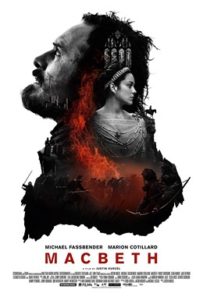“What’s Done is Done” – Braveheart Meets Shakespeare
Director: JUSTIN KURZEL/2015
 Macbeth is the latest in a long run of Shakespearean adaptations that seeks to find a way to stay true to source material and yet make it relevant for today. The last time a Shakespearean drama was tried on this scale was Mel Gibson’s take on the classic character Hamlet in Franco Zeffirelli’s 1990 version. But stylistically, director Justin Kurzel’s take on Macbeth emulates more of Mel Gibson’s 1995 film Braveheart, than it does the Zeffirelli version.
Macbeth is the latest in a long run of Shakespearean adaptations that seeks to find a way to stay true to source material and yet make it relevant for today. The last time a Shakespearean drama was tried on this scale was Mel Gibson’s take on the classic character Hamlet in Franco Zeffirelli’s 1990 version. But stylistically, director Justin Kurzel’s take on Macbeth emulates more of Mel Gibson’s 1995 film Braveheart, than it does the Zeffirelli version.
The obvious comparison with Braveheart is with the setting taking place in Scotland, along with the style of fights portraying angry Scotsman crashing into each other, though in Macbeth it is done with stylized stop-motion close-ups ala 300. Wide shots of the Scottish countryside portray the striking beauty of the land before the fog and softer blood-like hues begin creeping in foreshadowing the sinister path our title character is about to embark.
Michael Fassbender (X-Men: Days of Future Past, 12 Years a Slave, Prometheus) stars as the Scottish thane who is given a prophetic utterance by three witches he meets while at battle. It seems that he is to be king. Upon returning home to his wife, Lady MacBeth who is played wonderfully by Marion Cotillard (Two Days One Night, Inception, The Dark Knight Rises, The Immigrant), MacBeth finds his ambition causing him to think about the best way of seeing this prophesy come to fruition. Having recently lost their child, Macbeth and Lady Macbeth find themselves more willing to compromise their honor and dignity in search of power and the ability to control their destinies.
Macbeth takes his crown by force, covering up his dark deed by casting blame on the murdered king’s son who has fled the country, casting all manner of suspension upon himself. This paves the way for Macbeth’s rise to ruler, but a developing paranoia, guilt, and other prophesies from the witches seek to rob him of his newly-gained position.

Visually, Macbeth is stunning to look at. The film alternates between wide landscape shots, and tighter shots revealing the emotional wrestling that is happening within each of the characters portrayed. Coupled with a good use of contrasts such as dark and light, fog and rain, and more,Macbeth provides a beautiful palette in which to capture the protagonist’s decent into madness.
But while the film is visually striking and has an incredibly talented cast, what ultimately will hold it back is its handling of the source material itself. Namely the screenplay’s lack of character development and dialogue. Co-written by Jacob Koskoff and Michael Lesslie, the film sticks to the main points in Shakespeare’s play, but fails to fully develop the world Macbeth inhabits. Enough is given to follow the story, but the average audience won’t understand the significance of Scottish royal titles, how they’re conferred, and the like.
Whereas Zeffirelli’s Hamlet went out of its way to make sure that general audiences understood the dialogue, which was also delivered using the ‘olde English’ of Shakespeare’s day, Kurzel’s Macbeth is seemingly fine allowing the actors to reach for a more gritty portrayal at the expense of a more firm foundational understanding for the audience. Actor’s speak in hushed voices, or mumble altogether, making the average audience member not only have to filter what was said from the ‘olde English’, but also strain to hear any utterance being whispered on screen.

Ultimately, the inability to decipher the dialogue without considerable effort will keep this Shakespearean adaption from having the mass appeal needed to get high school students diving back into Shakespeare the way they were back in 1990 with Hamlet. And while the action shots are impressive and modern for this update on the classic tale, they are still ones that we have seen before in other films, most notably Braveheart and all of the war films it inspired. The good news is that this action keeps the pace moving and culminates into a well-done fight scene during the film’s climax that is equally strong in its execution as it is heartbreaking in his implications and conclusions.
Fassbender’s performance is very layered and will compliment the high praise he has earned for his portrayal of Steve Jobs earlier this fall. Much of his characterization of Macbeth is done with a steely calm of reluctance that provides a great contrast with the character who begins to lose control of his mental faculties. Marion Cotillard is able to provide us a Lady Macbeth who is sympathetic, lovely, cold, calculating, graceful, callous, and heartbroken. The cast is what elevates any shortcomings in the screenplay and character development.
Ultimately, Macbeth is a modern retelling that provides modern stylistic flourishes, coupled with an extremely talented cast that will mesmerize you visually but a story that will leave you indifferent to the experience unless you are well familiar with Shakespeare’s tale of tragedy. In the end we can only describe the film Macbeth the same way that Lady Macbeth does throughout the film:
“What’s done is done”.


